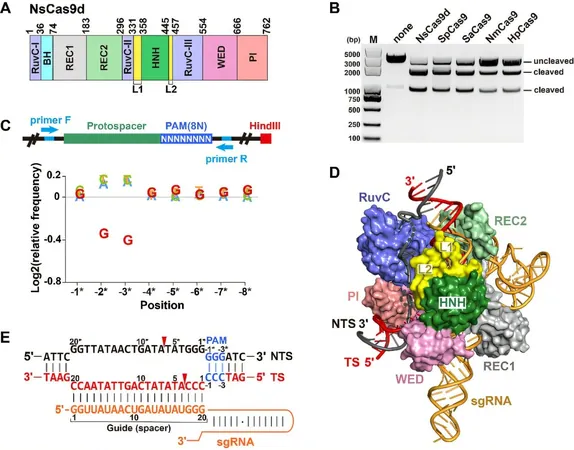
"Cancer Cured in Weeks!" AI Revolutionizes Tumor Hunting with Synthetic Proteins
2025-09-21
Author: Liam
The world of cancer treatment is on the brink of a groundbreaking transformation as artificial intelligence (AI) steps into the arena, drastically accelerating the development of personalized immune therapies. Unlike the traditional, time-consuming methods that can stretch over years, this innovative approach harnesses AI to design synthetic proteins that rev up the immune system’s ability to hunt down and destroy cancer cells.
A Revolutionary Acceleration in Cancer Therapy
Research recently unveiled in the journal Science showcases this significant leap forward, driven by a collaboration between the Technical University of Denmark and the Scripps Research Institute. Their AI platform targets specific cancer proteins, notably NY-ESO-1—found in a wide range of tumors—using it as a centerpiece for immune response activation.
With the AI's guidance, scientists crafted a specialized minibinder protein that attaches to the NY-ESO-1 structure, supercharging the immune system's capabilities. This process involves inserting the AI-designed protein into immune cells, which then become IMPAC-T cells, demonstrating a remarkable ability to identify and destroy NY-ESO-1 marked cancer cells.
Charting New Territory in Precision Medicine
What sets this AI platform apart is its capacity to extend beyond already recognized cancer targets, venturing into realms previously deemed unreachable. Researchers successfully generated minibinders for a novel target from a patient with metastatic melanoma, illustrating the system's potential to tailor therapies for previously elusive cancers.
As noted by Timothy P. Jenkins, an associate professor at DTU, this pioneering technology offers a suite of tools that allow scientists to swiftly design molecular keys aimed precisely at unique cancer cells, signaling an era of personalized treatments.
Ensuring Safety Through Smart Screening
A crucial challenge in crafting these new immune therapies is to avoid harming healthy cells. Cancer markers often mimic proteins present in normal tissues, leading to possible severe side effects. To combat this risk, the research team established a "virtual safety check." "Precision in cancer treatment is essential," emphasized Sine Reker Hadrup, a DTU professor.
The team used computer simulations to evaluate each minibinder against a wide array of pMHCs in healthy cells, filtering out potentially harmful designs before they ever reached the lab. This predictive screening boosts the chances of developing therapies that are both effective and safe for patients.
From Lab Bench to Patient Bedside
While laboratory results shine brightly, the path to clinical application is lined with meticulous steps. Jenkins anticipates that clinical trials might kick off in about five years. These trials will likely mirror current methodologies employed for certain blood cancers, which involve collecting and modifying a patient's immune cells.
What differentiates this AI-driven method is its ability to expedite and personalize the treatment process. By utilizing cutting-edge digital tools, scientists can efficiently create targeted therapies for specific tumor markers, potentially revolutionizing approaches to solid tumors—all while previously untreatable cancers could see hope, including those with one-off mutations.
A New Dawn for Precision Oncology
Crafting cancer-fighting proteins from scratch marks a pivotal shift in the realm of immunotherapy, demonstrating that turning digital models into functional treatments can be achieved in a matter of weeks. The synthetic minibinders developed act similarly to natural receptors, adeptly directing T cells towards their targets.
Tests in laboratory environments show these engineered immune cells have efficacy on par with traditionally developed counterparts, but they are realized through a faster and safer process. As AI approaches continue to evolve, the prospect of personalized cancer treatments becoming more efficient, precise, and accessible grows brighter than ever.
As AI integration into cancer treatment advances, critical questions emerge regarding the future landscape of precision medicine—what will the implications be for oncology and patient care in the years to come?









 Brasil (PT)
Brasil (PT)
 Canada (EN)
Canada (EN)
 Chile (ES)
Chile (ES)
 Česko (CS)
Česko (CS)
 대한민국 (KO)
대한민국 (KO)
 España (ES)
España (ES)
 France (FR)
France (FR)
 Hong Kong (EN)
Hong Kong (EN)
 Italia (IT)
Italia (IT)
 日本 (JA)
日本 (JA)
 Magyarország (HU)
Magyarország (HU)
 Norge (NO)
Norge (NO)
 Polska (PL)
Polska (PL)
 Schweiz (DE)
Schweiz (DE)
 Singapore (EN)
Singapore (EN)
 Sverige (SV)
Sverige (SV)
 Suomi (FI)
Suomi (FI)
 Türkiye (TR)
Türkiye (TR)
 الإمارات العربية المتحدة (AR)
الإمارات العربية المتحدة (AR)